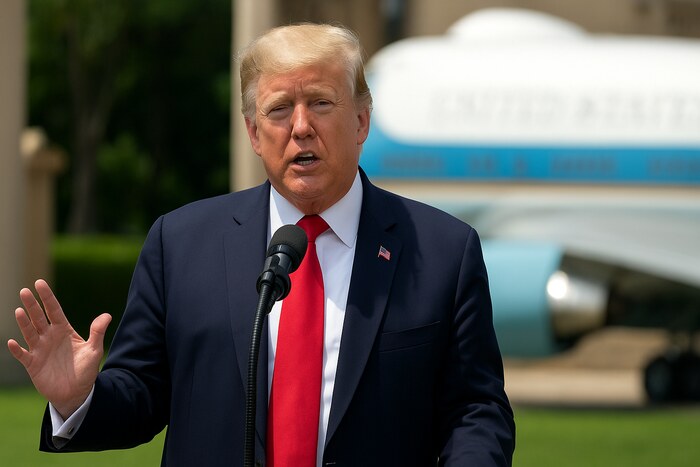WASHINGTON, D.C. — President Donald Trump has dismissed the likelihood of a full-scale U.S. war with Venezuela, despite a significant military buildup in the Caribbean Sea. Speaking on CBS’ 60 Minutes, Trump suggested that Venezuelan President Nicolás Maduro’s hold on power could soon end.
“I doubt it. I don’t think so,” Trump said when asked about a possible U.S.-Venezuela war. “But they’ve been treating us very badly.”
For nearly two months, U.S. forces have been increasing their presence across the Caribbean, deploying warships, bombers, fighter jets, drones, and marines in what officials describe as an anti-narcotics operation — the largest regional deployment in decades.
Massive U.S. Military Deployment in the Caribbean
The Trump administration continues to defend the operation as part of efforts to disrupt drug-smuggling routes and curb narcotics trafficking into the U.S. However, critics and regional leaders argue that the move appears politically motivated, hinting at Washington’s long-standing tensions with Maduro’s government.
“Every single boat that’s taken down saves 25,000 lives on drugs and destroys families all over our country,” Trump said from his Mar-a-Lago residence.
Reports by CBS News, the BBC’s U.S. media partner, reveal that at least 64 people have been killed in U.S. strikes across the Caribbean and eastern Pacific since early September.
Trump Refuses to Rule Out Further Action
When pressed about potential U.S. airstrikes on Venezuelan soil, Trump stopped short of denying the possibility.
“I wouldn’t be inclined to say that I would do that… I’m not gonna tell you what I’m gonna do with Venezuela,” he said.
The U.S. military has already conducted B-52 bomber exercises off Venezuela’s coast, while the CIA has reportedly been deployed to assist operations. The U.S. Navy’s largest aircraft carrier has also been dispatched to the region, intensifying speculation about future plans.
Venezuelan President Nicolás Maduro accused Washington of “fabricating a new war,” while Colombian President Gustavo Petro said the U.S. was using drug enforcement as “a way to dominate Latin America.”
Trump Targets Venezuelan Gangs and Immigration Issues
Trump also linked Venezuela to growing immigration and crime challenges, blaming the country for allowing dangerous gangs to operate.
“They come in from the Congo, from all over the world, but Venezuela in particular has been bad,” he said, calling Tren de Aragua “the most vicious gang anywhere in the world.”
His comments reflect a broader theme in Trump’s rhetoric — combining foreign policy and domestic security concerns under his “America First” agenda.
Nuclear Testing Remarks Raise Global Concerns
In another controversial moment, Trump said the U.S. may resume nuclear testing to keep pace with countries like Russia and China.
“We’re going to test nuclear weapons like other countries do,” Trump told CBS’ Norah O’Donnell.
However, U.S. Energy Secretary Chris Wright later clarified that there are no immediate plans to conduct live nuclear detonations, reassuring global allies and calming fears of renewed nuclear escalation.
Trump Blames Democrats for Prolonged Government Shutdown
The former president also addressed the ongoing government shutdown, now stretching past a month, blaming Democrats for the crisis.
“They’re crazed lunatics who have lost their way,” Trump said, but added that he expects them to “eventually come around.”
The shutdown has disrupted services for millions of Americans and remains a major source of political tension in Washington.
Dispute with CBS and Paramount Resurfaces
This was Trump’s first appearance on 60 Minutes since his legal battle with Paramount, CBS’s parent company. He sued over a 2024 interview with then–Vice President Kamala Harris, claiming the segment was edited to favor Democrats.
Paramount ultimately settled for $16 million, with the funds directed toward Trump’s planned presidential library. The company made no admission of wrongdoing and issued no apology.
Trump previously appeared on 60 Minutes in 2020, when he walked out mid-interview with journalist Lesley Stahl, accusing the network of bias.
The Bigger Picture: Tensions Rise in Latin America
While Trump insists the U.S. presence in the Caribbean is about combating drug trafficking, analysts warn that tensions with Venezuela could escalate into a wider regional conflict. Experts say the combination of military activity, political rhetoric, and intelligence operations suggests the U.S. is maintaining pressure on Maduro while keeping military options open.
As Washington balances foreign intervention concerns with domestic political battles, the situation in Venezuela remains volatile — with millions of Venezuelans already displaced by years of economic and political turmoil.


